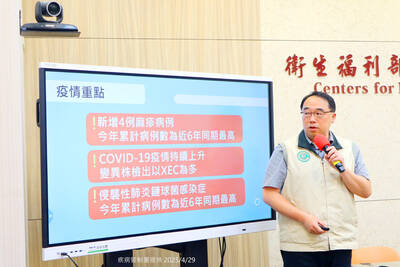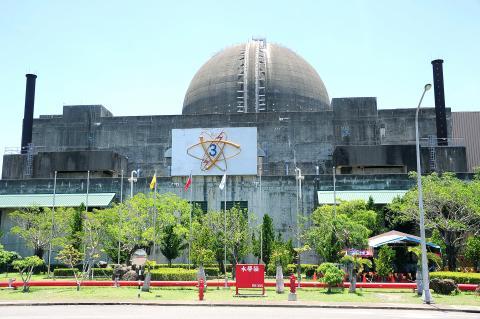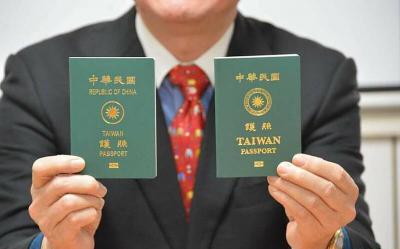Chinese Nationalist Party (KMT) lawmakers yesterday said they would propose an amendment to Article 46 of the Employment Service Act (就業服務法) to alleviate the nation’s shortage of live-in caregivers for the elderly.
Taiwan exhibited signs of becoming a hyper-aged society in 2018, KMT Legislator Huang Chien-pin (黃建賓) said.
There are about 2.75 million people aged 70 to 100 living in the country, he said, adding that the population of 80-year-olds is about 900,000.

Photo: Lin Che-yuan, Taipei Times
Huang cited a 2022 Ministry of Health and Welfare report saying that nearly 60 percent of elderly people experience weakness in their legs.
Statistics show that 87 percent of cancer patients are aged 55 or older, Huang said.
The families of elderly people need to spend more time looking after them, as they are less likely to seek treatment, especially for conditions such as cancer, he said.
Domestic caregivers cost about NT$50,000 to NT$60,000 per month, and only 20 percent of those who train in the field actually become caregivers, meaning demand outweighs supply, KMT Legislator Ma Wen-chun (馬文君) said.
Most people hire foreign caregivers as they only cost NT$20,000 to NT$30,000 per month, she said.
However, a family can only hire a foreign caregiver if the person they are caring for qualifies according to the Barthel index, which measures a person’s ability to complete daily activities.
The KMT is prioritizing its effort to pass amendments that would increase the number of people who are exempt from requiring a Barthel index assessment, Ma said.
There is a significant shortage of long-term caregivers, and families in need find it challenging to hire an ideal caregiver, KMT Legislator Yu Hao (游顥) said, adding that the situation has resulted in women sacrificing their careers to care for elderly family members.
The amendments to Article 46 are necessary to reduce the burden on families and uphold women’s right to work, he said.
KMT Legislator Niu Hsu-ting (牛煦庭) cited the Ministry of Labor’s attempt to relax regulations related to the Barthel index when highlighting the urgency of the amendments.
It is the ministry’s duty to re-evaluate regulations involving the Barthel index, Niu said, adding that it would help the economy if the government could reduce the burden placed on young and middle-aged people who have to care for the elderly.

A fugitive in a suspected cosmetic surgery fraud case today returned to Taiwan from Canada, after being wanted for six years. Internet celebrity Su Chen-tuan (蘇陳端), known as Lady Nai Nai (貴婦奈奈), and her former boyfriend, plastic surgeon Paul Huang (黃博健), allegedly defrauded clients and friends of about NT$1 billion (US$30.66 million). Su was put on a wanted list in 2019 when she lived in Toronto, Canada, after failing to respond to subpoenas and arrest warrants from the Taipei District Prosecutors’ Office. Su arrived at Taiwan Taoyuan International Airport at 5am today on an EVA Air flight accompanied by a

COVID-19 infections have climbed for three consecutive weeks and are likely to reach another peak between next month and June, the Centers for Disease Control (CDC) said yesterday. Weekly hospital visits for the disease increased by 19 percent from the previous week, CDC Epidemic Intelligence Center Director Guo Hung-wei (郭宏偉) said. From Tuesday last week to yesterday, 21 cases of severe COVID-19 and seven deaths were confirmed, and from Sept. 1 last year to yesterday, there were 600 cases and 129 deaths, he said. From Oct. 1 last year to yesterday, 95.9 percent of the severe cases and 96.7 percent of the deaths

Restarting the No. 2 reactor at the Ma-anshan Nuclear Power Plant would take up to 18 months, Minister of Economic Affairs J.W. Kuo (郭智輝) said today. Kuo was answering questions during a meeting of the Legislative Yuan’s Economics Committee, where legislators are considering amendments to the Renewable Energy Development Act (再生能源發展條) amid concerns about the consequences of the Pingtung County reactor’s decommissioning scheduled for May 17. Its decommissioning is to mark the end of Taiwan’s nuclear power production. However, Chinese Nationalist Party (KMT) lawmakers have proposed an amendment to the Nuclear Reactor Facilities Regulation Act (核子反應器設施管制法) that would extend the life of existing

The Ministry of Foreign Affairs yesterday demanded that Somalia reverse its decision prohibiting Taiwanese passport holders from entering or transiting through the country. Somalia said it is following the “one China” principle based on UN Resolution 2758. The ministry said that Somalia is misinterpreting the resolution under China’s instigation, creating a false impression that Taiwan is subordinate to China. The Somali Civil Aviation Authority told airlines on Tuesday last week that starting today, any passengers with passports or travel documents issued from Taiwan or its affiliated institutions would not be allowed to enter or transit through Somalia. The decision comes as Taiwan is boosting